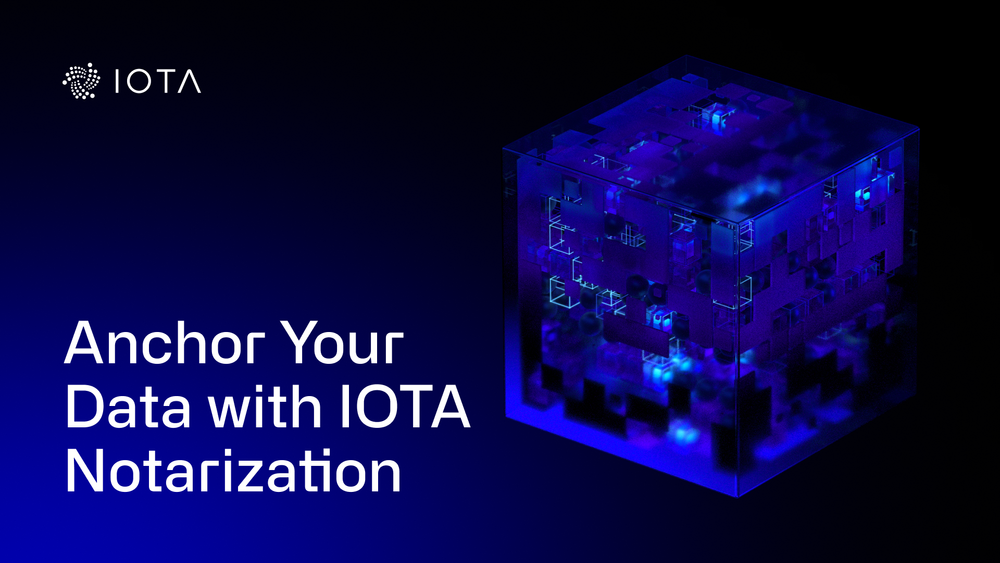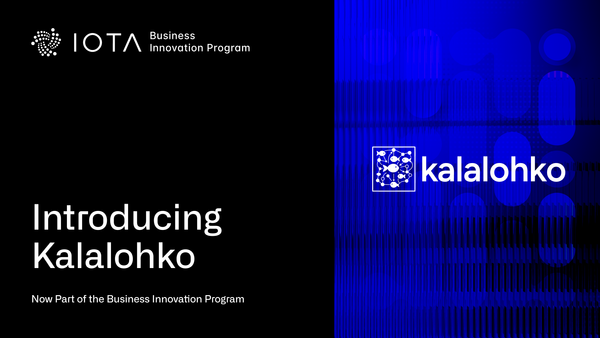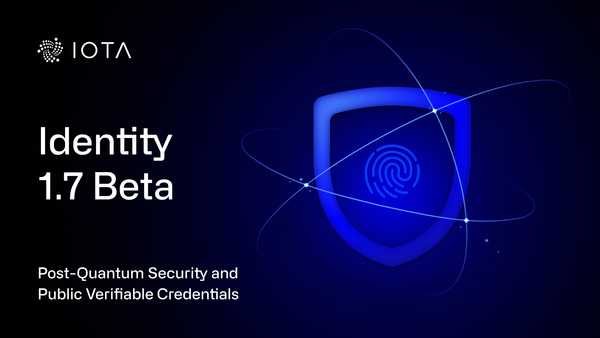Anchor Your Data with IOTA Notarization
Flexible, Tamper-Proof Records on IOTA
TL;DR:
IOTA Notarization is an open-source toolkit for creating and managing tamper-proof records on the IOTA network. This alpha release supports two notarization methods: Locked Notarization for permanent records like diplomas or contracts, and Dynamic Notarization for evolving data where mainly the most recent state is of increased importance, such as sensor readings or a product’s bill of materials.
Businesses rely on accurate records every day: supply chains demand precise tracking, certifications must be verifiable, and regulators require immutable audit trails. But traditional systems are often brittle. Centralized databases can be altered, lost, or tampered with – exposing organizations to costly errors and fraud.
In fact, document-related fraud alone costs organizations an estimated 5% of their annual revenues, amounting to billions of dollars each year. Whether it’s falsified invoices, manipulated credentials, or unauthorized changes to contracts, the financial and reputational risks are real.
IOTA isn’t here to replace these systems, but to complement them with an added layer of trust. Centralized solutions, whether on-premise or cloud-based, are essential for operational efficiency, internal workflows, and private data management. But when it comes to sharing trustworthy information across organizational boundaries, especially in large, multi-stakeholder ecosystems, traditional systems fall short.
This is where IOTA Notarization comes in.
Instead of relying on a single point of control, it enables the creation of decentralized, tamper-proof records that guarantee data authenticity and integrity. Businesses and private individuals can anchor critical information securely, confident that their data remains precisely as intended – verifiable by anyone, alterable by no one.
What Is IOTA Notarization?
IOTA Notarization is an open-source, modular toolkit for recording and verifying the integrity of data on the IOTA network. Whether you're building for compliance, traceability, or auditability, this product helps you anchor trust into your workflows in a way that makes sense for your use case.
It’s important to note that notarization does not mean storing entire documents on a public blockchain network. In most cases, you should only anchor a digital fingerprint (a cryptographic hash) of your data or document. The original file stays in your existing, private storage system, while the public ledger serves as an immutable proof of its existence and integrity over time.
This release introduces two notarization methods, each tailored to different business requirements:
Locked Notarization: For mission-critical, permanent records like certificates or contracts, Locked Notarization stores data immutably onchain, with an optional time-lock that prevents changes or deletion for a defined period.
Dynamic Notarization: When real-time updates matter most, like product status updates or digital passports, Dynamic Notarization maintains a single, updatable object onchain.
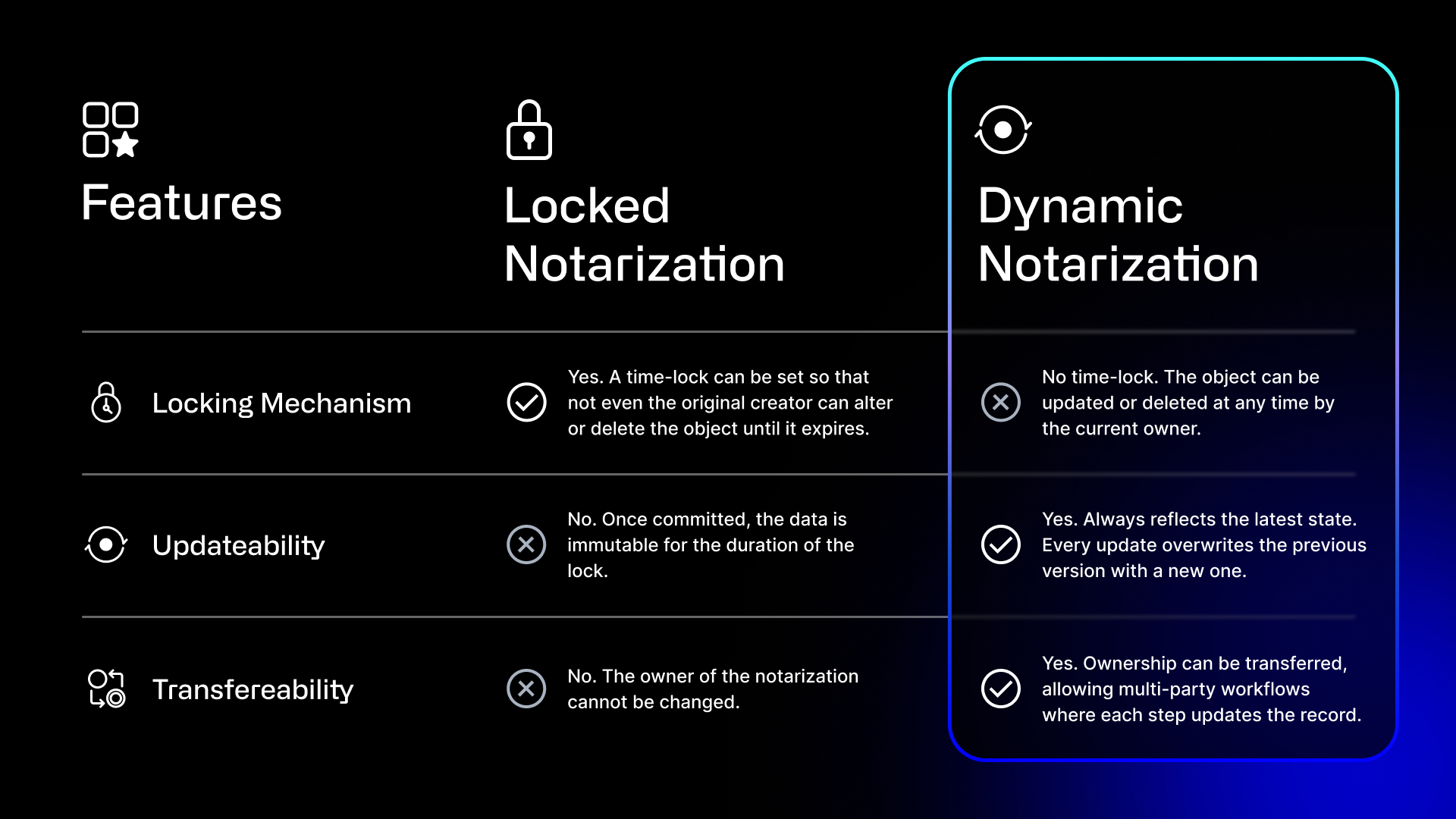
Who Is This For?
IOTA Notarization is built for developers, builders and organizations looking to integrate blockchain-based data authenticity and integrity proofs into their products. Whether you’re aiming for compliance, tracking, or verifiable records, IOTA Notarization provides ready-to-integrate tooling that can support operations across many industries:
Locked Notarization:
- Legal & Regulatory Compliance: Immutable contracts, court documents, or regulatory filings.
- Credentials & Certifications: Academic degrees, licenses, or certifications that must remain unaltered.
- Ownership & IP Protection: Deeds, patents, or timestamped works requiring proof of existence and authorship.
Dynamic Notarization:
- Digital Product Passports & Supply Chain: Continuously updated records capturing product lifecycle events.
- Public Registries & Digital Twins: Live records of assets, permits, or vehicles.
- IoT & Real-Time Systems: Ongoing updates from sensors or devices.
Regardless of the use case or the sector, we strongly recommend anchoring digital fingerprints (hashes) of sensitive documents – not the documents themselves – unless public visibility is explicitly desired. This ensures data integrity without compromising confidentiality.
How Does it Work?
You can integrate IOTA Notarization using Rust, WASM libraries, or directly with the Move-based smart contracts. Here’s how it works from start to finish – from anchoring data to verifying its integrity.
Key Concepts
- Original Data: The content you want to notarize – a file, record, or document.
- Stored Data: What’s written to the ledger – either the Original Data itself or a cryptographic hash of it.
- Prover: The party creating the notarization and later sharing it as proof.
- Verifier: The party checking whether the data is authentic and unchanged.
- Notarized Ledger Object: An onchain object containing the Stored Data and metadata like Identifier, timestamps, owner, version count, and optional time-lock.
- Identifier (Object ID): A unique reference to the notarized object used for lookup and verification.
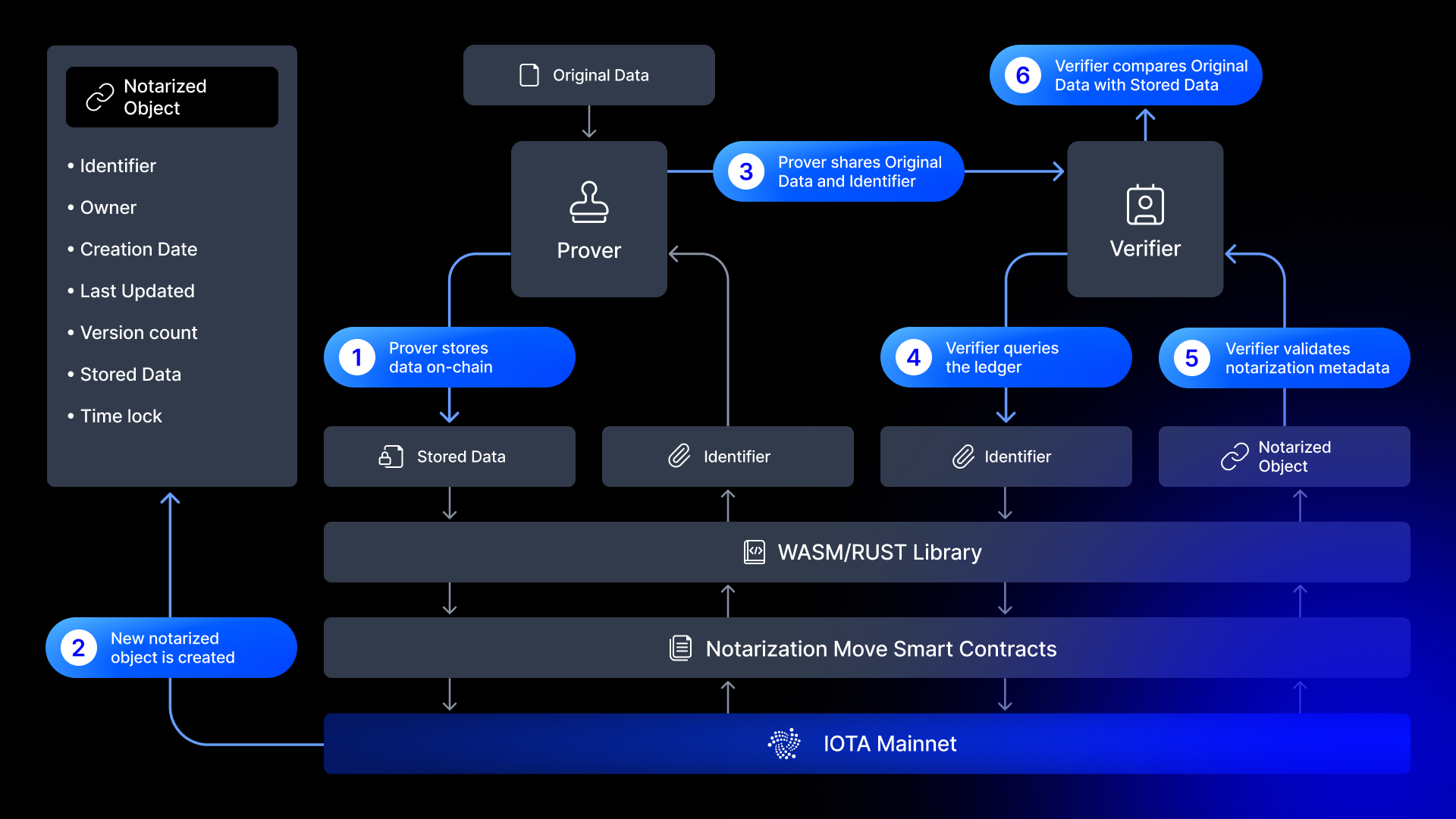
The Notarization Process
1. Prover stores data onchain: The Prover submits a transaction with the Stored Data – either the full Original Data or just its hash – depending on confidentiality requirements.
2. Notarized object is created: The ledger creates a new Notarized Object and returns a unique Identifier (Object ID) to the Prover.
3. Prover shares Identifier and data: The Prover shares the Identifier along with the Original Data (or its hash) with the Verifier.
4. Verifier queries the ledger: The Verifier uses the Identifier to retrieve the notarized object via the Rust/WASM SDK or Move smart contracts.
5. Verifier checks metadata: Before comparing data, the Verifier inspects metadata like the creation timestamp, owner, and version to confirm context.
6. Verifier validates integrity: The Verifier compares the onchain Stored Data with the provided Original Data or its hash. If they match, the notarization is confirmed as valid and tamper-proof.
Data Visibility Considerations
When using IOTA Notarization, it's crucial to understand that all notarized information becomes public on the IOTA network, and is thus visible and verifiable by anyone. This transparency is the very point of notarization on a public distributed ledger and ensures integrity, immutability, and verifiability through high availability of certain information.
Depending on your confidentiality needs, IOTA Notarization leaves you all the flexibility you need to implement different approaches:
- Clear-text Information: Data is intended to be openly readable by anyone, for example, in global digital product passports (DPP) proving sustainability and provenance data to the whole world.
- Encrypted Data: Data is stored encrypted but publicly accessible, with keys managed securely off-chain by authorized parties. For example, when decentralized, guaranteed data availability and redundancy outweigh confidentiality concerns.
- Digital Fingerprint (Hash): Only a cryptographic hash of the original data or document is stored onchain, while the actual content remains securely off-chain. This is the only option you should even consider for sensitive personal, healthcare, or proprietary business documents requiring strong confidentiality.
Always carefully evaluate your privacy requirements before using IOTA Notarization. Public ledgers guarantee data integrity – not privacy.
Get Started
- Check out the Notarization page on the IOTA network website.
- Visit the GitHub repository, find clear code examples to get up and running.
- Join the #notarization-dev channel on Discord and share your progress or doubts to get feedback from our development team.
- Explore the IOTA Docs for setup instructions and examples.
- Test in minutes. Go live with confidence. Deploy on the IOTA Testnet or Mainnet today.
Stamped and Sealed: IOTA Notarization
Notarization is one of the most universally applicable blockchain use cases. Simple in concept and powerful in practice, the IOTA Notarization alpha release puts verifiable trust in the hands of builders. It offers flexible tools to store, update, and verify data according to real-world requirements. Whether you need permanent records or dynamic updates, IOTA provides the scalability and precision to anchor your data your way.
Start notarizing your first object today. We’re excited to see what you build!

